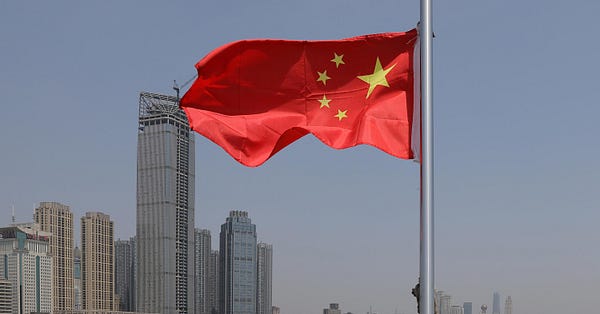Welcome to the 74th edition of Trade War.
The Chinese Communist Party prepares to celebrate its 100th anniversary on July 1. And a Chinese tech company taps former U.S. congress members as lobbyists.
Economists cut China’s 2021 GDP forecasts on weak consumption. And a noted scholar of the Chinese countryside warns of the prospect of increasing urban-rural polarization in China.
A note: Trade War will be taking a hiatus of several weeks as I travel to give a speech (see below) and then take some time off. My plan now is to publish the next edition on July 17.
One Hundred Year Anniversary of the CCP
As the Chinese Communist Party prepares to celebrate the 100th anniversary of its founding on July 1, it is feeling both triumphant and nervous, writes Columbia University China expert Andrew Nathan, in the Wall Street Journal.
With many remarkable achievements - including presiding over “the world’s second-largest economy, soon to be #1 if trends continue; an expanding high-tech military, including the world’s largest navy; sophisticated modern cities with a vast, entrepreneurial middle class; and universities and research centers pitching for leadership in the key technologies of the century ahead” - there appears to be “no sign of challenge to the authority of the top leader, Xi Jinping, and the party enjoys strong support among the Chinese public,” writes Nathan.
“Still, the CCP is worried—and for good reason,” he writes. “The great dilemma for the party is that the citizens of such a highly developed country are unlikely to accept the infantilizing control that its increasingly authoritarian regime imposes on them. A generational shift is under way in China, with traditional values giving way to more liberal attitudes, and it does not favor the long-term prospects of the CCP.”
While most Chinese still have “traditional attitudes of deference to authority and evaluate their government more for its ability to deliver economic growth and social services than for how it treats the liberty to think and speak,” that may change as “young, urban, educated Chinese increasingly want more freedom and a more responsive government,” Nathan writes.

Milton Friedman mixed with Vladmir Lenin
Even as the CCP nears 100 years in longevity, its leaders continues to struggle with the often conflicting goals of growth and stability, writes the Financial Times’ James Kynge.
“If the reforms are too fast, there is chaos. If the reforms are too slow, there is stagnation,” a noted Chinese bankruptcy expert put it to Kynge years ago. “This has meant that China’s rulers are constantly navigating between the Scylla and Charybdis of growth and control. To get more of one, they often have to sacrifice a measure of the other. But too much of either holds the threat of perdition,” writes Kynge.
On the one hand, economic reforms have led China to experience the “biggest and longest-run economic boom in history. In 1980, China’s annual gross domestic product stood at a mere $191bn, or $195 per capita, making it one of the poorest countries in the world. Nearly 40 years later, its GDP has increased 75 times to $14.3tn, or $10,261 per capita, in 2019,” according to Kynge.
At the same time, strongman ruler Xi Jinping has presided over the dismantling of key reforms that many believe have been key to China’s relative political stability in recent decades. Those include the abolishing of presidential term limits and an assault on “freedom of speech, freedom of association and freedom of demonstration.”
“Thus, a thumping contradiction hangs over China’s future. Beijing presides over a sophisticated, high-tech economy animated by energies that would have been familiar to Milton Friedman. But it does so with a political system that could have been designed by Vladimir Lenin,” explains Kynge.


Xinjiang surveillance company gets lobbying help in US
Hikvision, the surveillance company accused of providing cameras used in the crackdown on China’s Uyghur Muslims in Xinjiang, is getting lobbying help from former members of the U.S. Congress, reports the Washington Post.
Former U.S. representative Anthony “Toby” Moffett (D-Conn.) will work with former senator David Vitter (R-La.) at D.C. firm Mercury Public Affairs, lobbying for Hikvision’s U.S. subsidiary, facing sanctions under the National Defense Authorization Act. Moffett has filed with the Foreign Agents Registration Act, as has Vitter.
“Earlier this month, the Biden administration banned Americans from investing in the company, citing its links to the Chinese military. Hikvision, whose largest shareholder is owned by the Chinese government, faces another critical threat from U.S. regulators who are considering whether to issue a nationwide ban on purchases of the firm’s equipment,” reports the Post.
“Cities, counties and school districts across the United States have spent hundreds of thousands of dollars buying Hikvision’s security and temperature-scanning cameras, used to check for fevers during the coronavirus pandemic, according to contract data reported last month by TechCrunch.”


China pushes back on foreign sanctions
China is pushing back against foreign sanctions, write the Peterson Institute for International Economics senior researchers Mary E. Lovely and Jeffrey J. Schott.
“China is now adopting new blocking rules to nullify the effect of foreign sanctions or other measures “unjustifiably applied” against Chinese nationals,” write Lovely and Schott.
The new rules allow officials to prohibit companies from following foreign sanctions, “essentially forcing them to choose between access to the Chinese market and access to the US market, with penalties possible in either direction,” the authors write. “Multinational firms operating abroad are increasingly at risk of being caught firmly between US sanctions, including export controls, and Chinese countermeasures


Economists cut GDP estimates as consumption disappoints
Economists are cutting their estimates for China’s 2021 GDP in the face of disappointing May economic data, reports Bloomberg News.
Those include Oxford Economics, Barclays, and Morgan Stanley all of which pared their forecasts from around 9 percent growth and above, to below.
“The downward forecast revision mainly reflects the weaker-than-expected recovery in consumption and consumer-facing services so far this year,” Barclays economists led wrote. “We think some of the weakness in consumption could be long-lasting, reflecting changing consumer spending habits post-COVID as well as slowing household income, particularly among lower-income groups.”
“The recovery from the pandemic has been led by a property-fueled construction boom and surging industrial production for export, with consumer spending remaining the weak link -- and the key to more sustainable growth,” says an earlier Bloomberg report.
“High-end consumption is still out-performing more mainstream goods, suggesting the effects of a K-shaped employment recovery in China. Jewelry sales surged 31.5% year-on-year in May from a low base, while everyday categories such as food and clothing saw more modest rises.”

End of the ‘China Dream’ for 900 million from countryside?
Growing polarization between urban Chinese and the more than 900 million others who hail from the countryside could challenge China’s future stability, argues Stanford development economist Scott Rozelle in an interview discussing Invisible China, his new book coauthored with Natalie Hell.
“China has some of the highest rates of inequality in the world. And yet many of these people will say, “I’m much better off than my parents were…” And until now, this has sort of allowed them to buy into the system. There is also a long-held belief that the progress of the past will continue; that they will be better off 10 years from now. This is the China dream,” Rozelle tells The Wire China’s David Barboza.
“But if some of those people at the bottom begin to lose hope that the future will be better — and, if they see the lives of others, meanwhile, continuing to improve — you could start to have the emergence of a polarized society where wages for those in the lower income strata start to top off or even fall, and their employment prospects also fall. People could begin to say, “I don’t know what my life is going to be like 10 years from now.””


Notable/In Depth
The seeming anomaly of high levels of corruption coexisting with four decades of rapid economic growth in China is examined in this article by University of Michigan political scientist Yuen Yuen Ang in Foreign Affairs.


Major e-commerce platforms including Taobao.com and JD.com have been told to stop selling T-shirts, bumper stickers and other products with the words “lie down, lie-downism, involution,” reports China Digital Times.


How bookstores are still surviving as a source of independent thought in Hong Kong even as its media is being crushed, is the subject of this interesting article by the New York Times’ Tiffany May.


For sale in Hong Kong
For sale in Hong Kong - a friend got a picture of the Chinese edition of my book 《低端中国》in a Hong Kong bookstore. Glad it is still available there.


In-person speech/Chautauqua Institution
I am delighted to be doing my first in-person speech in a year on Thursday (7/1 - the 100th anniversary of the CCP) at the Chautauqua Institution. I will be talking about the real economic challenges China faces as it deals increasing polarization between city and countryside.


Montana night sky
A picture of the Montana sky taken at 1:30 am.


